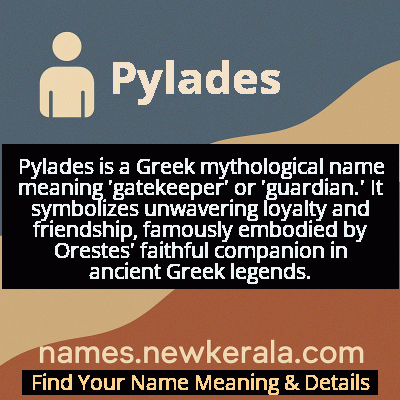Pylades Name Meaning & Details
Origin, Popularity, Numerology Analysis & Name Meaning of Pylades
Discover the origin, meaning, and cultural significance of the name PYLADES. Delve into its historical roots and explore the lasting impact it has had on communities and traditions.
Name
Pylades
Gender
Male
Origin
Greek
Lucky Number
1
Meaning of the Name - Pylades
Pylades is a Greek mythological name meaning 'gatekeeper' or 'guardian.' It symbolizes unwavering loyalty and friendship, famously embodied by Orestes' faithful companion in ancient Greek legends.
Pylades - Complete Numerology Analysis
Your Numerology Number
Based on Pythagorean Numerology System
Ruling Planet
Sun
Positive Nature
Leaders, ambitious, highly driven, self-reliant, innovative.
Negative Traits
Overly aggressive, domineering, impatient, selfish.
Lucky Colours
Red, orange, gold.
Lucky Days
Sunday.
Lucky Stones
Ruby, garnet.
Harmony Numbers
2, 3, 9.
Best Suited Professions
Entrepreneurs, managers, engineers.
What People Like About You
Courage, determination, leadership.
Famous People Named Pylades
Pylades of Greek Myth
Mythological Figure
Exemplar of friendship who helped Orestes avenge his father's murder
Pylades of Cilicia
Pantomime Dancer
Celebrated performer in ancient Rome known for artistic innovation
Pylades (Literary Character)
Theatrical Figure
Enduring symbol of loyalty in European drama and opera
Name Variations & International Equivalents
Click on blue names to explore their detailed meanings. Gray names with will be available soon.
Cultural & Historical Significance
During the Renaissance and Neoclassical periods, Pylades experienced a cultural revival as European artists and writers rediscovered classical texts. His character appeared in operas by composers like Gluck and plays by Racine, where he continued to symbolize unwavering loyalty. The name became associated with the Enlightenment ideals of friendship and reason, while maintaining its classical gravitas. Even in modern times, references to Pylades appear in psychological and philosophical discussions about the nature of friendship and moral commitment.
Extended Personality Analysis
Those bearing the name Pylades typically exhibit profound loyalty and reliability as core personality traits. They are the friends who remember birthdays, keep confidences, and show up during crises without being asked. This steadfast nature extends to their principles—once Pylades commits to a cause or belief, he rarely wavers. His loyalty isn't blind devotion but rather a carefully considered commitment based on deep moral conviction. This makes him both a trusted confidant and a formidable ally when principles are at stake.
Beyond loyalty, Pylades possesses a calm, reasoning nature that serves as an anchor for more impulsive companions. He demonstrates exceptional emotional intelligence, understanding when to offer counsel and when to provide silent support. While not necessarily charismatic or outgoing, he builds deep, meaningful relationships through consistent actions rather than grand gestures. His courage manifests not as recklessness but as the quiet determination to do what's right regardless of personal cost. These traits combine to create individuals who may not seek the spotlight but become indispensable pillars in their communities and relationships.
Modern Usage & Popularity
In contemporary naming practices, Pylades remains an exceptionally rare choice, primarily confined to academic circles, Greek families honoring mythological heritage, or parents seeking profoundly unique classical names. Its usage has never entered mainstream popularity charts in any country, maintaining its status as a scholarly and distinctive selection. The name occasionally appears in Greece and among diaspora communities, but even there it's considered unconventional. Modern parents who choose Pylades typically value classical education, literary references, or want to emphasize virtues of loyalty and friendship through their child's name. The name's rarity ensures that bearers will have a distinctive identity, though they may frequently need to explain its mythological origins and pronunciation.
Symbolic & Spiritual Meanings
Symbolically, Pylades represents the guardian of relationships and moral boundaries—the 'gatekeeper' of friendship and principle. His story metaphorically illustrates how true companionship involves not just shared joy but shared burden, representing the idea that friendship's ultimate test comes during adversity rather than prosperity. The name carries connotations of being the steady hand that guides through turmoil, the voice of reason in emotional storms, and the living embodiment of the classical ideal that friendship is a sacred bond. In broader symbolic terms, Pylades signifies the transformation of friendship from casual association to profound commitment, where loyalty becomes a conscious choice renewed daily through action rather than mere sentiment.

